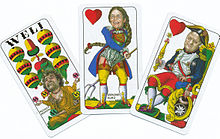Marjapussi is a traditional Finnish trick taking game for 4 players playing in 2 partnerships and is one of the Mariage family, its key feature being that the trump suit is determined in the middle of the play by declaring a marriage. There are variants of marjapussi for two and three players.
Pedro is an American trick-taking card game of the All Fours family based on Auction Pitch. Its most popular variant is known as Cinch, Double Pedro or High Five which was developed in Denver, Colorado around 1885 and soon regarded as the most important American member of the All Fours family. Although it went out of fashion with the rise of Auction Bridge, it is still widely played on the western coast of the United States and in its southern states, being the dominant game in some locations in Louisiana. Forms of the game have been reported from Nicaragua, the Azores, Niobe NY, Italy and Finland. The game is primarily played by four players in fixed partnerships, but can also be played by 2–6 individual players.
Pitch is the American name of the English trick-taking game of Blind All Fours which, in turn, is derived from classic All Fours. Historically, Pitch started as "Blind All Fours", a very simple All Fours variant that is still played in England as a pub game. The modern game involving a bidding phase and setting back a party's score if the bid is not reached came up in the middle of the 19th century and is more precisely known as Auction Pitch or Setback.
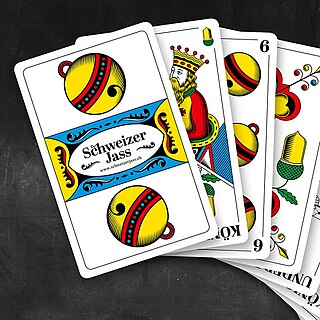
Jass is a family of trick taking, ace–ten card games and, in its key forms, a distinctive branch of the marriage family. It is popular in its native Switzerland as well as the rest of the Alemannic German-speaking area of Europe, Italian South Tyrol and in a few places in Wisconsin, Ohio, California, Oregon and Washington USA.
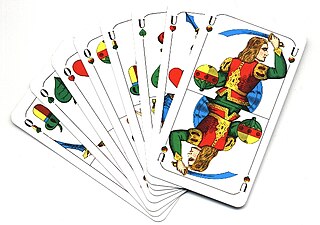
Schafkopf, also called Bavarian Schafkopf, is a popular German trick-taking card game of the ace–ten family for four players that evolved, towards the end of the 19th century, from German Schafkopf. It is still very popular in Bavaria, where it is their national card game played by around two million people, but it also played elsewhere in Germany and in Austria. It is an official cultural asset and important part of the Old Bavarian and Franconian way of life. Schafkopf is a mentally demanding pastime that is considered "the supreme discipline of Bavarian card games" and "the mother of all trump games."

Klaverjas or Klaverjassen is a Dutch, four player, trick-taking card game that uses a Piquet pack of 32 playing cards. It is closely related to the internationally popular card game of Klaberjass. Klaverjas is one of the most popular card games in the Netherlands, traditionally played in cafes and social clubs. The game offers a considerable level of complexity and depth. It has numerous variants, but its basic rules are universal.

Gaigel is a card game from the Württemberg region of Germany and is traditionally played with Württemberg suited cards. It is a Swabian variant of Sechsundsechzig and may be played with 2, 3, 4 or 6 players. However, a significant difference from Sechsundsechzig and other related games like Bauernschnapsen is the use of a double card deck. The four-player game is usually called Kreuzgaigel. The game emerged in the early 19th century.

Bieten, Laubbieten, Lab bietn or Labbieten or Bavarian Poker is a card game that is popular in the Austrian Tyrol and the Bavarian Prealps. It used to be a game frequently played by timber rafters and muleteers. It can be seen as a precursor to the traditional Tyrolean game of Perlaggen. The unusual feature of Bieten is the nature of the competition. The players have the option, even if they have a poor hand, of persuading their opponent(s) to cave in through skilful bidding (Bieten) and bluffing.

Perlaggen, formerly Perlagg-Spiel, is a traditional card game which is mainly played in the regions of South Tyrol in Italy, the Tyrolean Oberland and the Innsbruck areas of Austria. It is the only card game to have been recognised by UNESCO as an item of Intangible Cultural Heritage.
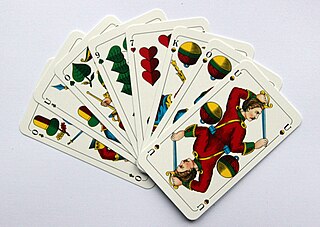
Mucken or Muck is a variation of the popular German card game, Schafkopf. However, unlike Schafkopf, it must always be played in teams of 2 players, so there are no soloist or Rufer ("caller") contracts. Mucken is mainly found in the province of Upper Franconia in the German state of Bavaria. Mucken is often played in Franconian restaurants, as it is part of the Franconian pub culture. The details of the rules vary greatly, even from village to village.

Zwanzigerrufen or Zwanz'gerrufen is the leading trick-taking card game of the Tarock family in many regions of eastern Austria. Its rules are simpler than the game of Königrufen which is more widely played in the whole of Austria. As is common in Tarock games, the cards have various point values – the primary goal in an individual game is to win the majority of points.

Bohemian Watten, sometimes called Bohemian Ramsen, is a trick-taking card game for two to four players. In fact, Bohemian Watten bears more resemblance to Zwanzig ab, Ramsen and Schnalzen than Watten itself.
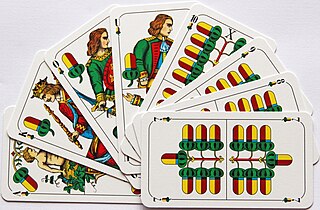
Wallachen is an Old Bavarian card game, which used to be very popular in eastern Bavaria. Although, by 2012, it had become a rarer sight at pub tables, there have been more recent moves to revive it. Wallachen is a relatively simple three-hander that is easy to learn. As a result, like Grasobern, it has a relatively relaxed character without the mental demands of Schafkopf or the psychological stress of Watten. It is a member of the Préférence family of card games.

Blattla is a Bavarian card game for four players, who usually form two teams of two for each deal. It is a simplified version of Schafkopf and Bierkopf and is thus a point-trick game. Unlike those two games, in Blattla the Obers and Unters are not permanent trumps. In order to learn the rules of Schafkopf, it can be an advantage to first become familiar with Blattla. The game is traditionally played with Bavarian pattern cards.

Bauerchen, also Bauerchens, Bauerspiel, Bauersche or Bauersches, is a trick-taking card game of the ace–ten family for four players that is played in the Palatinate region of Germany, especially around the city of Kaiserslautern, as well as in south Hesse. It is often played during leisure times as an alternative to well known games such as Schafkopf or Skat. Regular Bauerchen tournaments also take place. The game is named after its four permanent trumps or "Bowers".

Ramsen or Ramsch is a traditional Bavarian plain-trick, card game for three to five players that is played with a 32-card German-suited pack and is suitable both for adults and for children. It is one of the Rams group of card games that are distinguished by allowing players to drop out if they think they will fail to win the required number of tricks. An unusual feature of Ramsen is the presence of four permanent trump cards that rank just below the Trump Sow (Ace). It should not be confused with the contract of Ramsch in games like Skat or Schafkopf, nor with the related game of Rams which is also called Ramsenin Austria, but is played with a Piquet pack, does not have permanent trumps and has a different card ranking.

Jaggln or Jaggeln is an historical Tyrolean card game designed for five players that used to be played purely as a winter pastime by farming folk. An unusual feature are its three highest trumps known as Jaggl, Zanggl and Buggl. The aim is to win the majority of Gewisses – i.e. the four Sows, the four Tens and the Jaggl. So, for example, if a player holds all three top trumps, he is certain to win 3 tricks. And if, in doing so, he captures the four Sows, he has won because he has five of the nine Gewisses.
Zwanzig ab, 20 ab or simply Zwanzig is card game for four players. It is a member of the Rams family in which the key feature is that players may choose to drop out of the game if they believe their hand is not strong enough to take a minimum number of tricks. It appears to be a recent, internet-propagated variant of Schnalzen or Bohemian Watten. However, the latter has a natural card ranking, is played with double German cards and a Weli, has no exchanging and has a different scoring system. It is suitable for children from 8 upwards. It may be related from Fünf dazu! which is a simpler game described by Gööck in 1967 that has neither trumps nor the option to drop out.

Gilten or Giltspiel is a "very old" Austrian card game for four players, playing in partnership, with 32 German-suited cards of the William Tell pattern. Despite its age, it is still played locally in parts of Austria today. It is a trick-taking game which involves betting on the outcome and certain card combinations.
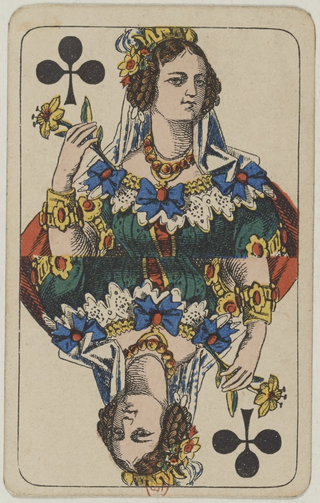
Sjavs is a Danish card game of the Schafkopf family that is played in two main variants. In Denmark, it is a 3-player game, played with a shortened pack of 20 cards; in the Faroe Islands, where it is very popular, it is a four-hand, partnership game using a standard piquet pack of 32 cards.

